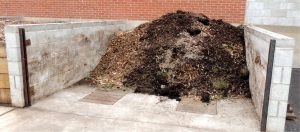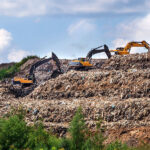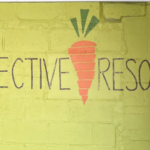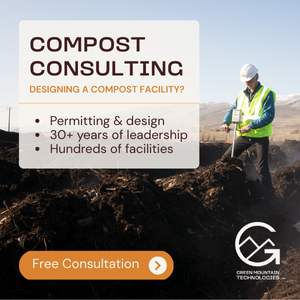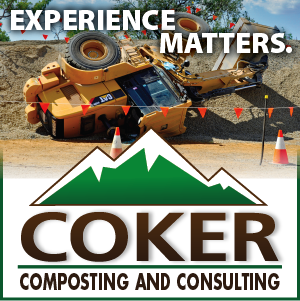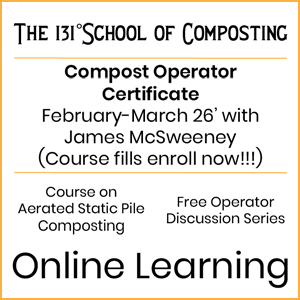BioCycle June 2015
New York, New York: Updated NYC Master Composter Manual
The New York City Department of Sanitation (DSNY) recently released its updated NYC Master Composter Manual, “which strives to provide New York City’s composters with the tools and knowledge they need to manage high-performing community compost sites.” The updated manual was developed with the help of NYC Compost Project partner organizations, which include Brooklyn Botanic Garden, Build It Green!NYC, Earth Matter NY, Lower East Side Ecology Center, Queens Botanical Garden, Snug Harbor Cultural Center & Botanical Garden, and the New York Botanical Garden. The 223-page manual is organized as a training course, and each chapter includes detailed information supplemented with illustrations and hands-on activities. For example, the first chapter, Soil and Decomposition Science, suggests activities like a Soil Composition and Soil Texture test, Decomposer Hide & Seek, and a Compost Critter Quiz. Other chapters in the manual include: Composting; Compost Systems & Tools; Site Design & Management; Rebuild NYC’s Soils Using Compost, Mulch, & Cover Crops; and Reaching & Teaching Others.
Cape Town, South Africa: Agricultural Development And Organic Recycling Processing Facility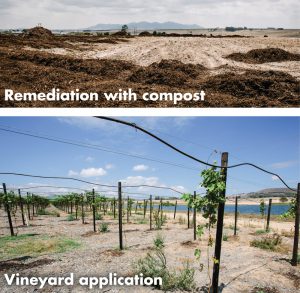
Reliance Compost’s new flagship project is the Agricultural Development and Organic Recycling Processing Facility at the Corona Farm, about 30 miles from Cape Town (near Paarl). The project has five main components: Alternative energy; rehabilitation of damaged agricultural land; food security; job creation; and redistribution of agricultural land. It will include an anaerobic digester designed to process organics from the municipal, commercial and industrial sectors, including food waste, yard trimmings, biosolids and abattoir and wine residuals. A composting operation also will be constructed. “Operations are scheduled to start in mid-2016,” says Tiffany McKie,
Marketing Coordinator at Reliance Compost. The biogas-generated energy will be used to power vehicles and equipment. At least 50 jobs will be created.
About 1,000 acres of depleted soil are currently being rehabilitated after decades of mining sand and gravel, and being transitioned into agricultural land. The first phase of the project is yielding 35 acres of table grapes planted. Compost produced by Reliance Compost — which has been composting green waste at its Cape Town site for 16 years — is being used in the soil rehabilitation program. Eventually, the rehabilitated lands will be divided into agricultural units planted with fruit, vegetables and horticultural plants. The units will be made available for redistribution to formerly disadvantaged individuals who show potential as successful entrepreneurs. “Each individual will be mentored for up to five years until they show success at farming their unit before the title deeds are handed over,” explains Eddie Redelinghuys, Managing Director of Reliance Compost.
Philadelphia, Pennsylvania: Food Scraps Composting At Prison Complex
The Philadelphia Prison System (PPS), a county jail facility, houses about 8,000 inmates in a complex comprised of six facilities. In 2010, PPS received a $15,000 grant from U.S. Environmental Protection Agency Region 3 to conduct a food scraps composting pilot. The PPS had conducted a food waste sort in coordination with Aramark, its foodservice contractor, which estimated that each inmate generates about 1.4 lbs/day of food waste. The pilot involved setting up a separation program at the Riverside Corrections Facility, a women’s prison that houses about 800 inmates. Roughly 1,100 lbs/day of food scraps are generated, primarily from plate scrapings as the central kitchen that prepares meals for all of the facilities is located in a different prison in the complex. The food scraps are collected Monday through Friday, and brought to an on-site composting operation that utilizes positively aerated bays designed by 02 Compost.
The PPS was able to expand its composting program after receiving a $60,000 grant from the City of Philadelphia’s Office of Sustainability. The composting site was expanded, and a second facility, the House of Corrections (1,200 inmates), began separating food scraps last November for collection. But due to the severe winter, PPS decided to stop servicing the House of Corrections until this spring. A full story on the PPS food scraps composting program will appear in an upcoming issue of BioCycle.
Sacramento, California: Governor Proposes Increased Funding
For Organics Recycling
California Governor Jerry Brown released his “May Revise Budget Proposal,” which included increased funding for reducing greenhouse gas emissions through organics recycling, utilizing recycled materials in manufacturing, and building healthy soils. Governor Brown increases to $60 million (from $25 million in the 2014 budget) the funding in California’s Cap and Trade Expenditure Plan (CTEP) for waste diversion, including financial incentives for capital investment to build out California’s composting and anaerobic digestion infrastructure. In addition, the budget allocates $20 million of CTEP funding for a new Healthy Soils Initiative that will support demonstration projects that enhance soil’s ability to sequester carbon, retain water, boost crop yields, and decrease erosion through on-farm practices, like the use of compost.
West Chester, Pennsylvania: Thorny Project For Thornbury Farm
Due to the Pennsylvania Department of Environmental Protection’s (PADEP) overly onerous permitting process, a local farm was unable to accept food waste from the Table-Scrap Collection Project, a 6-month composting pilot in West Chester. The project, funded by a $15,000 U.S. EPA grant awarded to West Chester University (WCU), aimed to encourage local restaurants to divert organics to composting. It was supported by Borough Leaders United for Emissions Reduction, West Chester’s Public Works Department and the Business Improvement District. Three restaurants volunteered to divert their food waste for the entire pilot: Landmark Americana, Roots Café and Three Little Pigs. According to the plan, Thornbury Farm, a 360-year-old working farm in West Chester, would receive the food waste from June through November 2014. Public Works Office approved it, as the EPA grant would pay the additional employee wages and fuel costs.
“Originally, Thornbury Farm signed on to accept the food waste,” says WCU professor Denise Polk, “but it was not a permitted facility. They composted their own waste, but couldn’t accept outside waste. We tried to get a provisional permit for the six months, but were not able to get it through the PADEP.” Adds Randall Spackman, Thornbury’s owner who simply wanted more organics in order to make compost for use on his farm: “It took so long to even be able to submit the data. The form we have to use is the same as for a major landfill. Indeed, notes Polk, despite a preapplication meeting with the PADEP last summer, and Spackman addressing specific criteria, Thornbury’s application has been rejected twice.
“At this point, it is becoming so daunting, it makes the initiation of this kind of project very discouraging, as opposed to just buying fertilizer, which I can do any day of the week, versus having inspections and filing papers,” says Spackman. “As soon as we bring in something like a food scrap, it becomes municipal waste, and it doesn’t matter if it’s a teacup or a truckload. They don’t have a vehicle for small mom-and-pop composting facilities.”
Consequently, explains Polk, the pilot program found a permitted facility that agreed to take the organics. By November, the three restaurants had diverted 44.31 tons of food waste. “The restaurants were very happy,” she says, adding that Roots reported a 60 percent reduction in its waste. Spackman adds he has not given up on the composting project, “This is something we will continue to work on. It would be a great project once it gets started.”



